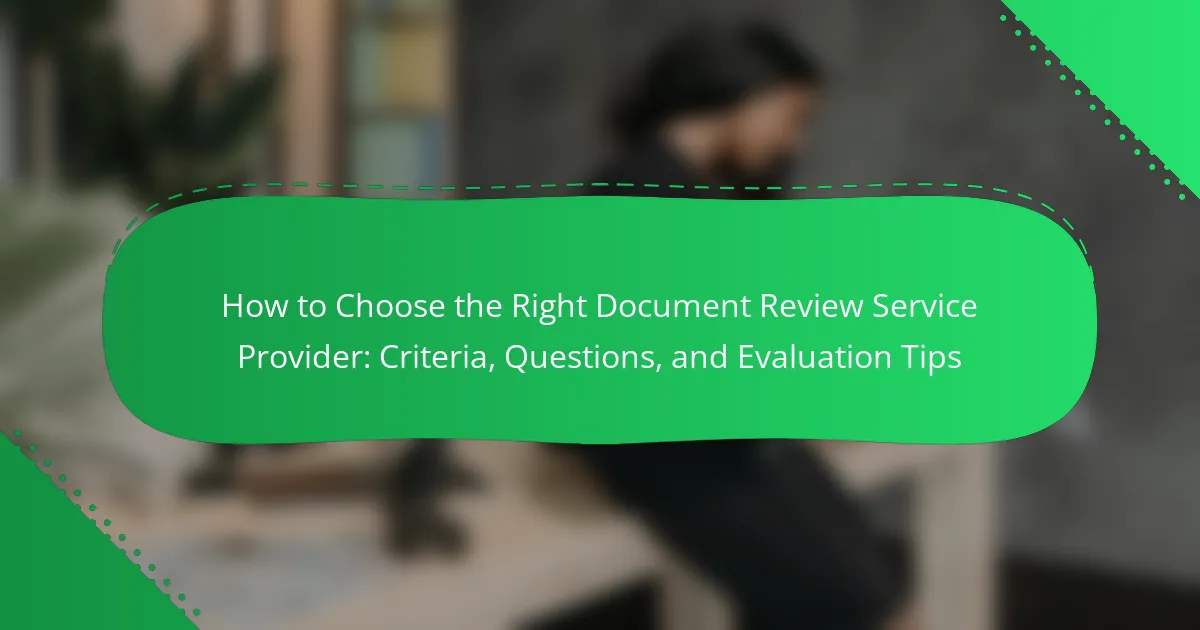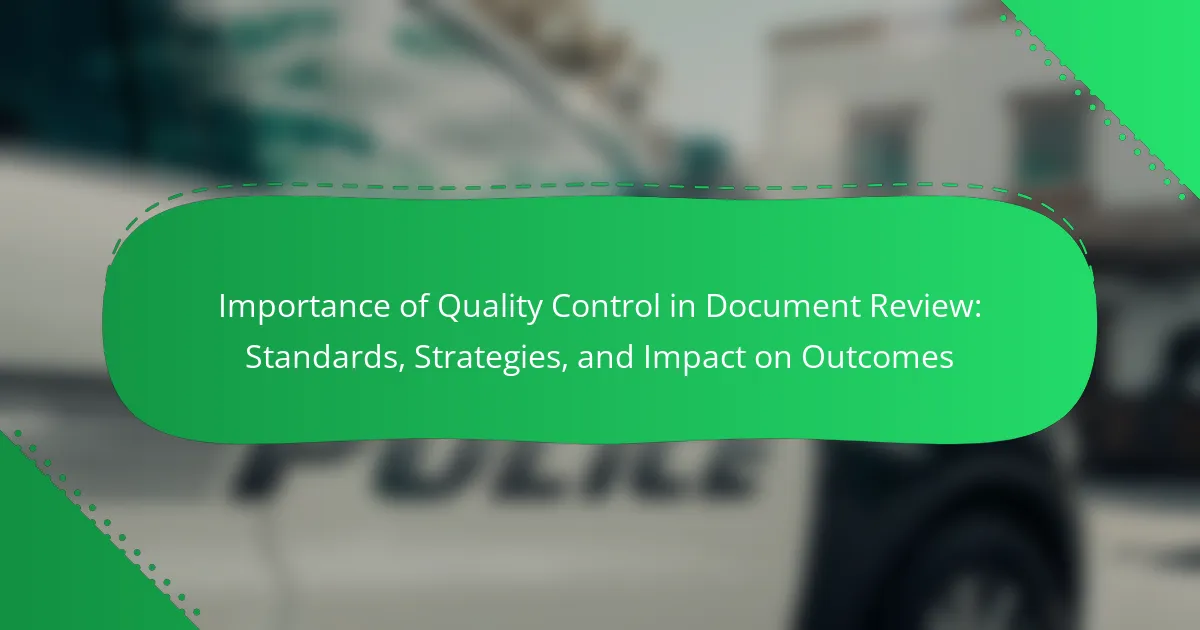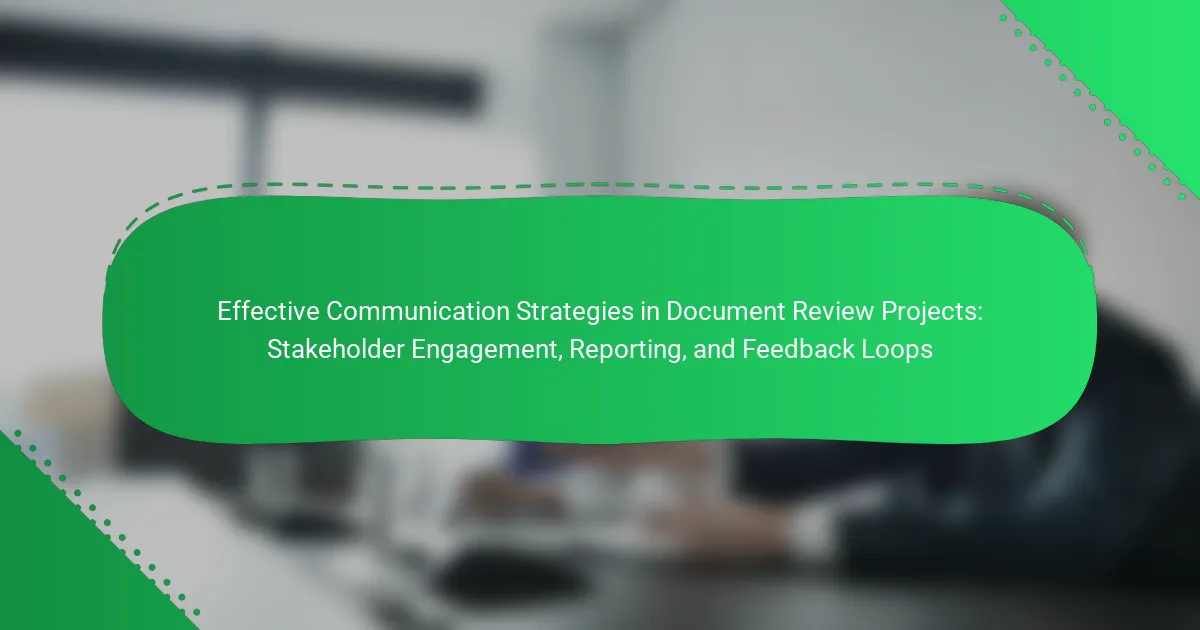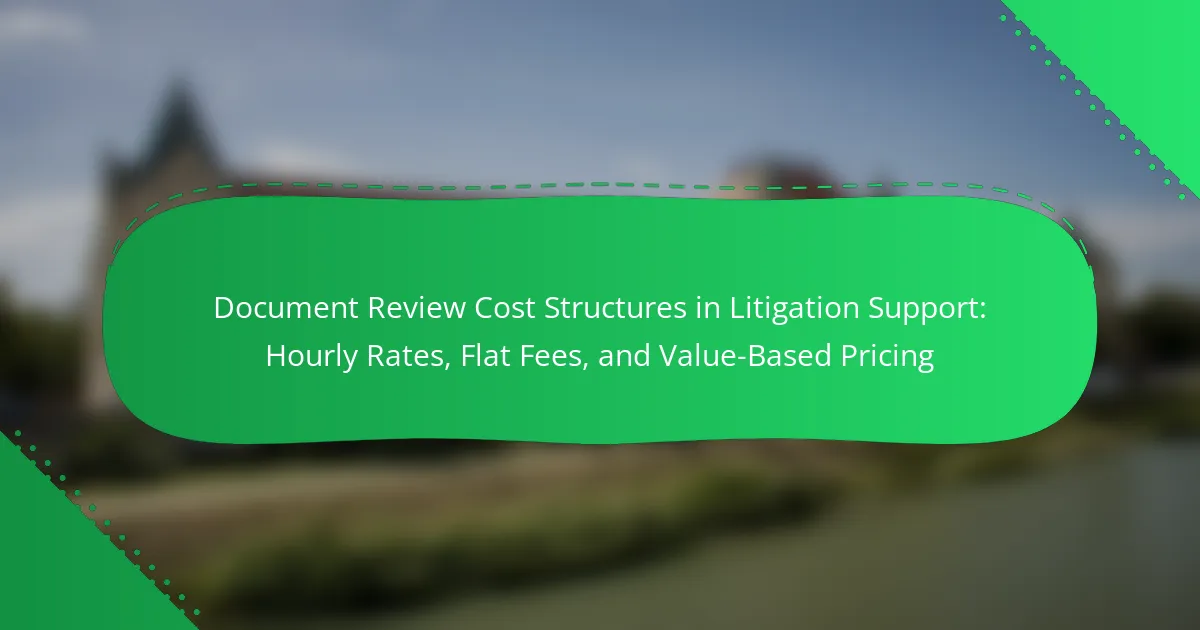A Document Review Service Provider specializes in the analysis and organization of documents for legal and compliance purposes. This article outlines key criteria for selecting the right provider, emphasizing the importance of expertise, technology, and scalability. It also highlights essential questions to ask potential providers, including inquiries about industry familiarity, quality control processes, and data security measures. Additionally, the article discusses the evaluation of client testimonials and pricing structures to ensure transparency and reliability in document review services.
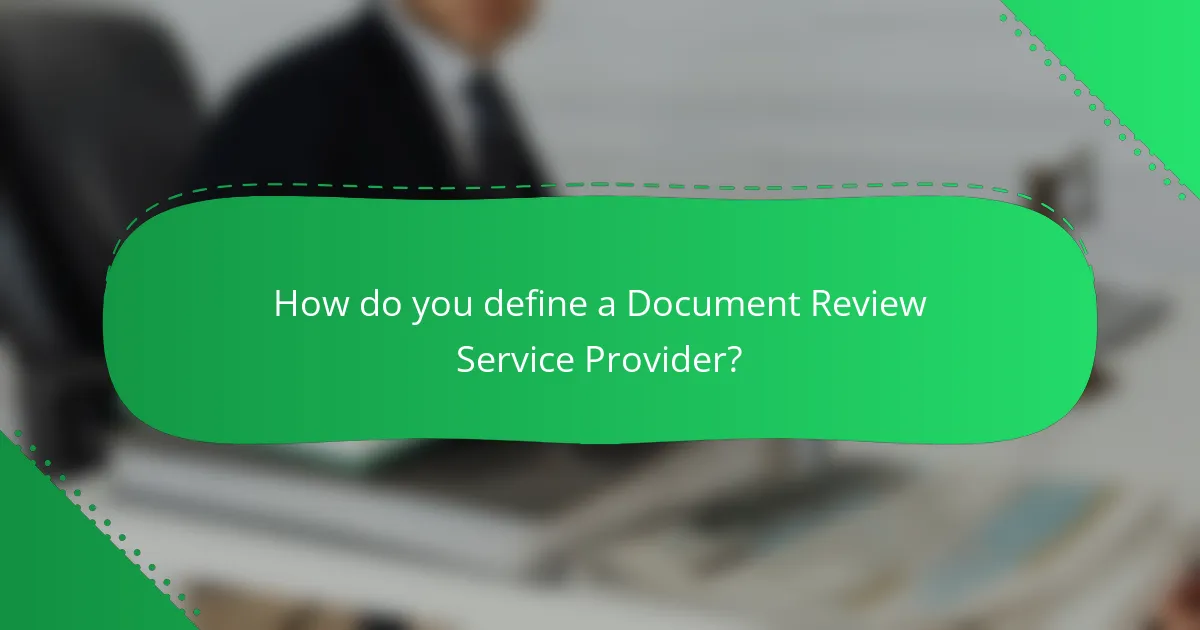
How do you define a Document Review Service Provider?
A Document Review Service Provider is a company that specializes in analyzing and organizing documents for legal or compliance purposes. These providers often employ legal professionals to ensure accuracy and relevance in document analysis. They assist in identifying key information, assessing document relevance, and ensuring compliance with legal standards. Document Review Service Providers can handle large volumes of documents efficiently. They utilize advanced technology and software to streamline the review process. This service is crucial in litigation, mergers, and regulatory compliance. Their expertise can significantly reduce the time and cost associated with document review tasks.
What are the key functions of a Document Review Service Provider?
A Document Review Service Provider primarily conducts the analysis and evaluation of legal documents. They ensure compliance with relevant regulations and legal standards. This service includes identifying key information and relevant facts within documents. Providers often categorize and summarize findings for easier access. They utilize technology to enhance efficiency and accuracy in the review process. Additionally, they may offer support in document production and preparation for litigation. Many providers also assist in managing large volumes of data effectively. These functions are crucial for legal teams to make informed decisions.
How does a Document Review Service Provider ensure quality in document review?
A Document Review Service Provider ensures quality in document review through rigorous processes and standards. They employ experienced legal professionals to conduct the reviews. These professionals are trained in specific legal standards and practices. The provider often utilizes technology to enhance accuracy and efficiency. Quality control measures are implemented at various stages of the review process. Regular audits and feedback loops help maintain high standards. Metrics such as error rates and turnaround times are monitored for continuous improvement. By adhering to industry best practices, they ensure reliable outcomes for clients.
What technologies do Document Review Service Providers typically use?
Document Review Service Providers typically use advanced technologies such as eDiscovery software, machine learning, and artificial intelligence. eDiscovery software helps in organizing and analyzing large volumes of documents efficiently. Machine learning algorithms assist in identifying relevant documents quickly by learning from previous data. Artificial intelligence enhances the review process by automating repetitive tasks and improving accuracy. Additionally, cloud-based platforms are often utilized for secure data storage and collaboration. These technologies streamline the document review process, making it faster and more cost-effective.
Why is selecting the right Document Review Service Provider crucial?
Selecting the right Document Review Service Provider is crucial for ensuring efficiency and accuracy in legal processes. An appropriate provider can significantly reduce the time needed for document analysis. This leads to faster case resolutions. Additionally, a skilled provider minimizes the risk of errors in document handling. Errors can lead to costly legal repercussions. Furthermore, the right provider offers tailored solutions that meet specific project requirements. This customization enhances the overall quality of the review process. Research indicates that effective document review can save firms up to 30% in costs related to litigation. Thus, choosing the right service provider is essential for optimizing both time and resources in legal matters.
What risks are associated with choosing an inadequate Document Review Service Provider?
Choosing an inadequate Document Review Service Provider can lead to several significant risks. One major risk is the potential for inaccurate document analysis. This can result in missed critical information, affecting case outcomes. Another risk involves data security breaches. Inadequate providers may lack proper security measures, exposing sensitive information. Additionally, poor quality control can lead to inconsistencies in document handling. This can undermine the reliability of the review process. Delays in project timelines are also common with inadequate providers. These delays can impact overall legal strategies and client satisfaction. Ultimately, choosing a subpar provider can lead to increased costs due to rework and remediation efforts.
How can the right provider enhance the efficiency of document review processes?
The right provider can enhance the efficiency of document review processes by utilizing advanced technology and skilled personnel. They often employ artificial intelligence tools to automate repetitive tasks. This reduces the time needed for manual review. Skilled personnel ensure accurate assessments of documents. Their expertise leads to quicker identification of relevant information. Providers also streamline workflows to minimize bottlenecks. A well-organized process can significantly decrease turnaround times. Additionally, they offer scalable solutions to handle varying volumes of documents. This flexibility allows for efficient management of resources. Overall, the combination of technology and expertise drives efficiency in document review.
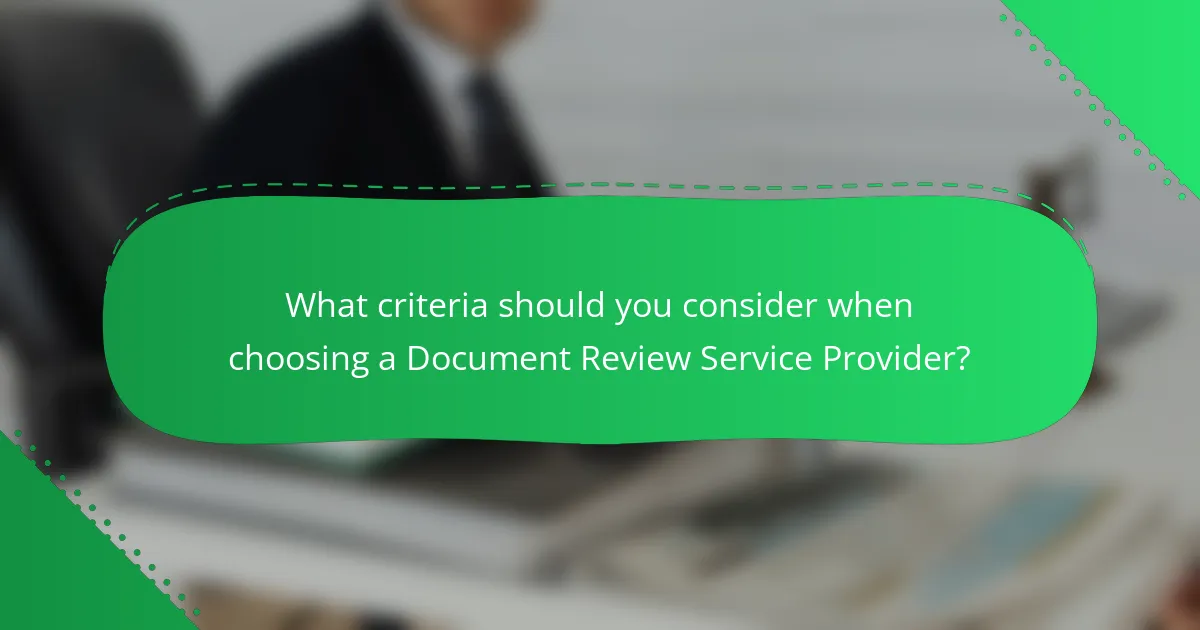
What criteria should you consider when choosing a Document Review Service Provider?
When choosing a Document Review Service Provider, consider their expertise and experience in handling similar cases. A provider with a proven track record in your specific industry can better understand your needs. Evaluate their technology and tools for document review efficiency. Advanced software can enhance accuracy and speed in the review process. Assess the scalability of their services to accommodate fluctuating project sizes. Flexibility in resource allocation is essential for varying demands. Review client testimonials and case studies for insights into their reliability and quality. Positive feedback from previous clients indicates a trustworthy provider. Lastly, consider the cost structure and transparency in pricing. Clear pricing helps avoid unexpected expenses during the review process.
How important is the provider’s experience and expertise?
The provider’s experience and expertise are crucial in selecting a document review service. Experienced providers are more likely to understand complex legal matters and specific industry requirements. Their expertise often translates into higher quality work and fewer errors. Research indicates that providers with extensive backgrounds can complete projects more efficiently. This efficiency can lead to significant cost savings for clients. Furthermore, expertise in document review can enhance the overall reliability of the service. Therefore, choosing a provider with proven experience and expertise is essential for successful document review outcomes.
What qualifications should you look for in a Document Review Service Provider?
Look for a Document Review Service Provider with legal expertise and relevant experience. They should have a team of qualified attorneys or paralegals. Verify their familiarity with specific document types and industries. Check for proficiency in e-discovery tools and technology. Ensure they have a robust quality control process in place. Look for positive client testimonials and case studies. Confirm compliance with data security and confidentiality standards. Assess their ability to meet deadlines and manage large volumes of documents efficiently.
How does the provider’s track record influence your choice?
The provider’s track record significantly influences your choice by demonstrating reliability and expertise. A strong history of successful projects indicates that the provider can handle complex document reviews effectively. Positive testimonials and case studies often highlight their ability to meet deadlines and maintain quality. Statistical data, such as a high client retention rate, can further validate their competency. Additionally, awards or industry recognition can serve as proof of their standing in the market. Evaluating these aspects helps ensure you select a provider that aligns with your specific needs and expectations.
What role does technology play in selecting a Document Review Service Provider?
Technology is crucial in selecting a Document Review Service Provider. It enhances efficiency and accuracy in document analysis. Advanced software tools automate the review process, reducing manual labor. Technology enables better data management through secure cloud storage solutions. It also facilitates real-time collaboration among team members. Analytics tools provide insights into document trends and patterns. These features improve decision-making and reduce review time. According to a study by Gartner, firms using advanced document review technology can cut costs by up to 30%.
What specific technological capabilities should a provider have?
A document review service provider should have advanced data analytics capabilities. These capabilities enable the provider to efficiently process large volumes of documents. They should utilize machine learning algorithms for predictive coding. This technology enhances accuracy in identifying relevant documents. Additionally, the provider should support secure cloud storage solutions. This ensures data protection and accessibility from various locations. Furthermore, integration with existing legal software is essential. This capability streamlines workflows and improves productivity. Providers must also offer real-time collaboration tools. These tools facilitate communication among team members during the review process. Overall, these technological capabilities enhance efficiency and effectiveness in document review.
How does technology integration impact the document review process?
Technology integration significantly enhances the document review process. It streamlines workflows and improves efficiency. Automated tools can quickly sort and categorize documents. This reduces the time needed for manual review. Advanced search functionalities allow for faster retrieval of relevant information. Analytics can identify patterns and trends in large datasets. Furthermore, collaboration tools facilitate real-time communication among team members. A study by the American Bar Association found that technology can reduce document review time by up to 50%. Thus, integrating technology in document review processes leads to faster, more accurate outcomes.

What questions should you ask potential Document Review Service Providers?
What questions to ask potential Document Review Service Providers include inquiries about their experience and expertise. Ask about their familiarity with your specific industry. Inquire about their process for quality control and accuracy. Confirm their technological capabilities and tools used for document review. Verify their data security measures to protect sensitive information. Ask about their turnaround times for project completion. Inquire about their pricing structure and any additional fees. Finally, request references or case studies to assess their past performance.
What are the essential questions to gauge a provider’s capabilities?
What are the essential questions to gauge a provider’s capabilities? Key questions include: What experience does the provider have in document review? This assesses their familiarity with the process. What technology and tools do they use for document review? Advanced technology can enhance efficiency. How do they ensure quality control during the review process? Quality assurance measures are crucial for accuracy. What is their turnaround time for projects? Timeliness is vital in document review. How do they handle confidentiality and data security? Protecting sensitive information is essential. What is their pricing structure? Understanding costs helps in budgeting. Do they provide references or case studies? This can validate their expertise and reliability.
How can you assess the quality of a provider’s past work?
Evaluate a provider’s past work by reviewing their portfolio and client testimonials. A comprehensive portfolio showcases previous projects and demonstrates the provider’s expertise. Client testimonials provide insights into the quality of service and satisfaction levels. Look for case studies that highlight specific challenges and successful outcomes. Check for industry recognition or awards that validate the provider’s reputation. Additionally, consider the consistency of their work across different projects. This assessment helps determine if the provider meets your standards and requirements.
What questions should you ask about the provider’s review process?
What questions to ask about the provider’s review process include: How is the review process structured? What criteria are used for document selection? Who conducts the reviews, and what qualifications do they have? What technology or tools are utilized during the review? How is quality assurance maintained throughout the process? What is the average turnaround time for reviews? How are revisions or feedback handled? What metrics are used to measure the success of the review? These questions help evaluate the provider’s efficiency and reliability.
How can you evaluate the pricing structures of Document Review Service Providers?
To evaluate the pricing structures of Document Review Service Providers, analyze their pricing models. Common models include hourly rates, flat fees, and per-page pricing. Compare these models to understand their implications for your budget. Review what is included in the pricing. Some providers may charge extra for services such as project management or specialized technology. Assess the transparency of pricing. Clear, itemized quotes indicate a trustworthy provider. Investigate any hidden fees that may arise during the review process. Research market rates to gauge if a provider’s pricing is competitive. Look for client testimonials regarding pricing satisfaction. This can provide insight into the value received for the cost.
What factors should influence your budget considerations?
Key factors influencing budget considerations include service quality, project complexity, and timeline. Service quality impacts overall effectiveness and accuracy. Higher quality often correlates with higher costs. Project complexity affects the resources required and the level of expertise needed. More complex projects may incur additional fees. Timeline requirements can also influence costs. Urgent projects typically require expedited services, which can increase expenses. Additionally, consider the provider’s reputation and past performance. Established providers may charge more but offer reliability. These factors collectively guide budget decisions for document review services.
How can you compare pricing models among different providers?
To compare pricing models among different providers, analyze each provider’s pricing structure. Key pricing models include hourly rates, flat fees, and per-page costs. Hourly rates charge based on the time spent on the review. Flat fees provide a single price for the entire project. Per-page costs charge based on the number of pages reviewed.
Next, evaluate the scope of services included in each model. Some providers may offer additional services like project management or technology support. Assess the value of these services against the price.
Additionally, consider any hidden fees or additional costs that may arise. Some providers may charge for revisions or additional consultations.
Finally, gather feedback from previous clients about their experiences with pricing transparency and overall satisfaction. This feedback can provide insights into the true cost-effectiveness of each provider.
What are some best practices for choosing a Document Review Service Provider?
Evaluate the provider’s experience in document review services. Look for a history of successful projects and client testimonials. Assess the provider’s expertise in your specific industry. Specialized knowledge can enhance the quality of the review process. Check the technology they use for document review. Advanced tools can improve efficiency and accuracy. Ensure they have a robust quality control process in place. This minimizes errors and ensures thorough reviews. Review their pricing structure for transparency and competitiveness. Clear pricing helps in budgeting and avoids unexpected costs. Finally, assess their customer support and communication. Effective support can facilitate smoother project management.
Document Review Service Providers are specialized companies that analyze and organize legal documents for compliance and litigation purposes. This article outlines the criteria for selecting the right provider, including their expertise, technology capabilities, and quality control processes. Key questions to ask potential providers, risks associated with inadequate choices, and best practices for evaluation are also discussed. Additionally, the article emphasizes the importance of technology integration and pricing structures in enhancing efficiency and accuracy in document review processes.
